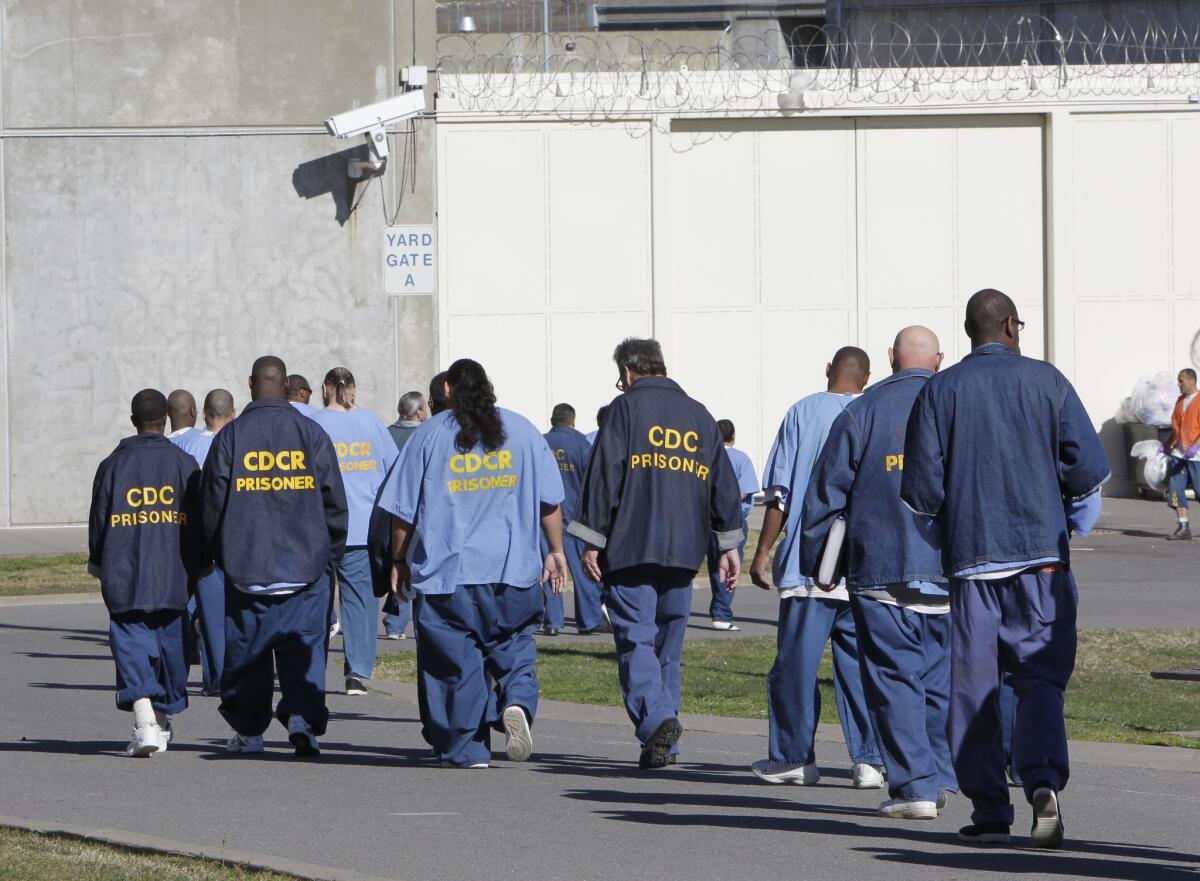Prop. 20, which would have toughened sentencing in criminal cases, is rejected by California voters

- Share via
SACRAMENTO — Proposition 20, a California initiative that would have toughened sentencing in criminal cases and reduced the number of prison inmates eligible for early parole, was rejected by state voters on Tuesday.
The measure by law enforcement and prosecutors hit the ballot just as the Black Lives Matter movement was drawing new attention to demands for change in the criminal justice system to reduce incarceration and its disproportionate effect on people of color.
“The defeat of Proposition 20 is a significant milestone in California’s ongoing effort to make its criminal justice system more effective, and the rejection of mass incarceration by voters is a major advance for the national criminal justice reform movement,” said Jay Jordan, executive director of Californians for Safety and Justice, the organization behind many of the reforms that Proposition 20 targeted to eliminate.
Proposition 20 was opposed by 62% of the voters, according to the state’s unofficial election tally.
The initiative would have added 22 crimes, including felony domestic violence, rape of an unconscious person and human trafficking of a child, to the list of offenses that make prison inmates ineligible for early parole under a previous initiative approved by voters in 2016.
The ballot measure voted on Tuesday also would have increased penalties for repeat shoplifters and members of organized theft rings, and collected DNA samples from adults convicted of some misdemeanors.
“While we’re confident that those who heard our pro-victim, pro-consumer message voted ‘yes’ — and we’re grateful for their support — we just weren’t able to educate as many Californians as we’d hoped on how Prop. 20 would tackle violent crime and retail theft,” said Richard Temple, a political consultant for Proposition 20.
Former Gov. Jerry Brown, who played a key role in some changes that would be rolled back by Proposition 20, campaigned against the measure and criticized its supporters, calling the measure “vindictive.”
On Tuesday night he said voters have supported past criminal justice reform measures including Proposition 57.
“A small group of people got together and wanted to roll back Prop. 57,” Brown said during a Zoom election night gathering shortly after the polls closed. “This is an important night.”
He noted it would cost millions of dollars more to keep people behind bars longer, which is money that he said could otherwise could go to rehabilitation and other programs.
California Gov. Jerry Brown is airing ads criticizing Proposition 20, calling it a “prison spending scam.” The California State Sheriffs’ Assn., a frequent opponent of Brown’s that represents the state’s 58 sheriffs, said the measure is urgently needed for public safety.
Brown put $1 million from his political accounts into the campaign against Proposition 20. Opponents of the measure raised more than $7.6 million, including $2 million from the Chan Zuckerberg Initiative, a philanthropic investment group created by Facebook Inc. Chief Executive Mark Zuckerberg and his wife, Dr. Priscilla Chan.
The campaign in favor of Proposition 20 raised $4.8 million, including $2 million from the California Correctional Peace Officers Assn., the prison guards union.
The measure is supported by the California Republican Party and opposed by the state Democratic Party.
The proponents of Proposition 20 said it was meant to address flaws in previous criminal justice laws, including Proposition 57 in 2016, Proposition 47 in 2014 and Assembly Bill 109 in 2011.
The past laws have contributed to reducing the population of California prisons by one-third in the last decade, or about 50,000 inmates.
One law change increased the value of stolen merchandise that could result in a felony charge from $450 to $950, which law enforcement officials say has contributed to a spate of serial thefts of goods just under the higher threshold.
Proposition 20 would have created a new felony for serial theft when a person is caught for the third time committing thefts valued at $250 or more. The initiative was supported by retail grocery store chains such as Albertsons and Kroger.
The San Francisco-based Center on Juvenile and Criminal Justice, which advocates for reducing incarceration, estimates that up to 9,900 arrests on theft-related offenses could be charged as felonies rather than misdemeanors each year under Proposition 20.
The group estimated that 66% of the people sent to jail or prison under Proposition 20 would be Black, Latino, Asian or other Californians of color.
The initiative would also have required the collection of DNA samples from adults convicted of crimes newly classified as misdemeanors under AB 109, including forging checks and certain domestic violence crimes. Cooper predicted that would result in an additional 2,000 hits on DNA evidence annually, helping law enforcement solve many more old crimes.
More to Read
Sign up for Essential California
The most important California stories and recommendations in your inbox every morning.
You may occasionally receive promotional content from the Los Angeles Times.












